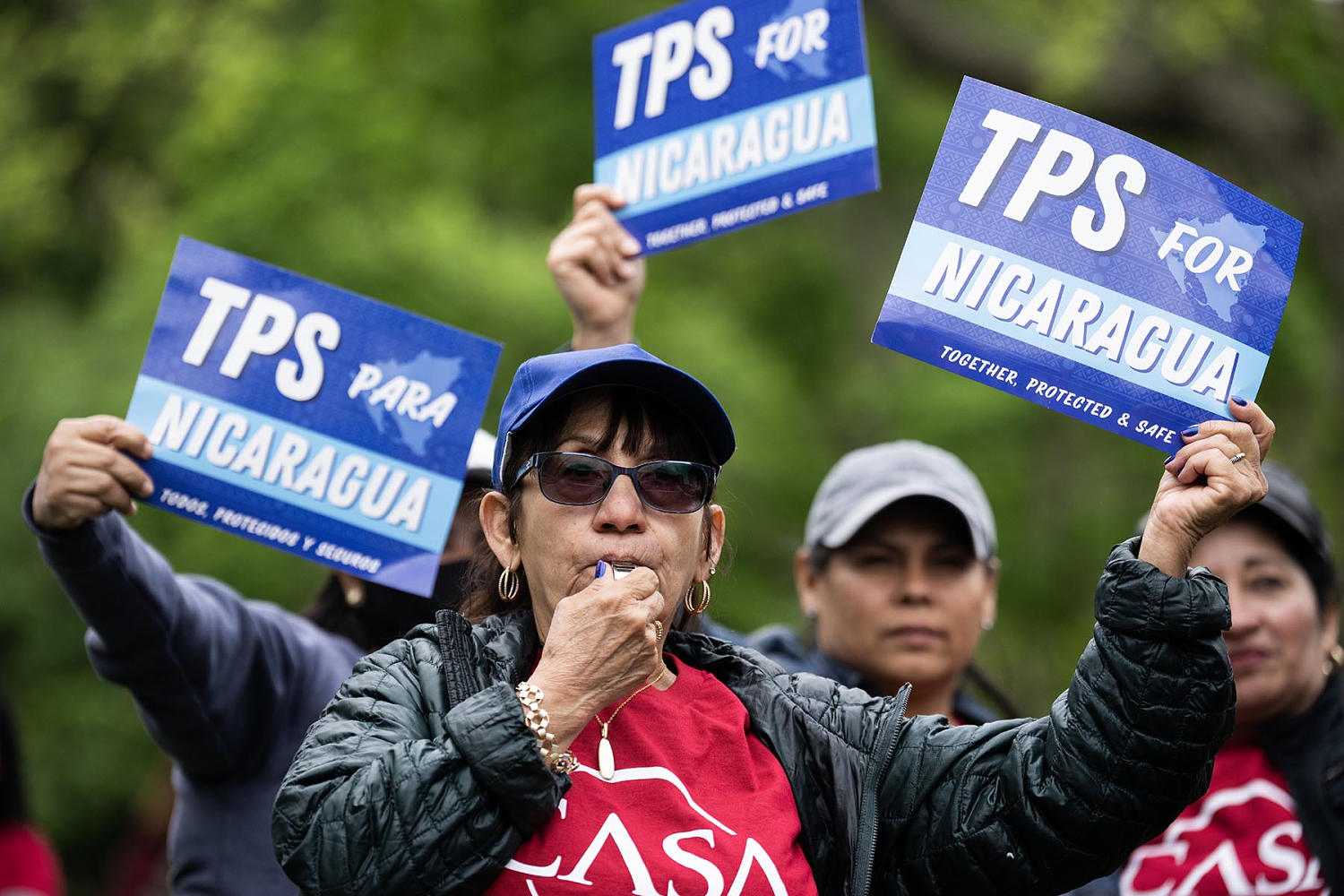
A group of immigrants with temporary legal status in the U.S. is suing the Trump administration after the Department of Homeland Security terminated the legal protections for some 60,000 people from Nicaragua, Honduras and Nepal.
Seven plaintiffs from the affected countries, along with the National TPS Alliance, an advocacy group, have filed the lawsuit against DHS and the agency’s secretary, Kristi Noem, alleging that the terminations were, at least in part, motivated by racial animus and violated the Constitution.
Nicaragua, Honduras and Nepal have experienced natural disasters that have made it unsafe for their nationals to return home, leading to Temporary Protected Status (TPS) designations. On Monday, the Trump administration terminated the designation for those from Nicaragua, with a DHS spokesperson saying in a news release that the status “never meant to last a quarter of a century.” It also terminated TPS for Honduras, with Noem similarly saying that TPS was designed to be “just that — temporary.” Just over a month ago, DHS terminated the designation for Nepal.
The terminations, the lawsuit said, will impose “extraordinary and irreparable harm” on TPS holders if the decisions aren’t reversed.
“I work in a hospital, caring for cardiac patients. I’ve been doing it the ‘right way’ the whole time,” Jhony Silva, a Honduran TPS holder and a plaintiff in the case, said in a release from the ACLU of Southern California, one of the legal groups representing the plaintiffs. “Now, I am facing losing my job, the ability to care for my family, and the only home I’ve ever known.”
Department of Homeland Security spokesperson Tricia McLaughlin said the lawsuit “ignores the President’s constitutionally vested powers.”
“TPS was never intended to be a de facto asylum program, yet that’s how previous administrations have used it for decades,” McLaughlin said in a statement. “The Trump administration is restoring integrity to our immigration system to keep our homeland and its people safe. We have the law, the facts, and common sense on our side.”
The lawsuit alleges that Noem, Trump and other officials made “numerous” statements against non-white, non-European TPS holders based on their perceived race, ethnicity and national origin. In many cases, the suit said, officials disparaged TPS holders as “criminals.”
Under Noem’s tenure, DHS has criticized the program for being responsible for, the suit says, allowing “half a million poorly vetted migrants into this country — from MS-13 gang members to known terrorists and murderers” — referring to a DHS social media post from May after the Supreme Court allowed Trump to revoke TPS from nationals of four countries. However, the suit points out, TPS is available only to those who are already in the U.S. And anyone with more than one misdemeanor conviction does not qualify for the status.
The suit also claims that the Trump administration’s decision was based on predetermined political decisions and that DHS failed to give TPS holders a sufficient transition period. According to DHS announcements, TPS holders are being given 60 days before they will be stripped of their legal status and work authorizations. This means those from Nepal will have their status until Aug. 5. The lawsuit alleges that DHS violated the Administrative Procedure Act by abandoning the longstanding practice of providing a transition period of at least six months when terminating TPS designations in place for more than three years, as they were in the cases of all three countries.
“This administration is forcing TPS holders — and their U.S. citizen children — to make an impossible choice,” said Ahilan Arulanantham, co-director of the UCLA Center for Immigration Law & Policy (CILP), another group representing the plaintiffs. “They cannot safely go back to their country of nationality, leaving their families and communities, and yet they will be stripped of the right to live and work in the U.S.”
While DHS has determined that the countries are environmentally safe to return to, critics say that the terminations could upend lives and put TPS holders in danger. The State Department has designated Nicaragua as a country Americans should reconsider traveling to, citing crime, the arbitrary enforcement of laws, the risk of wrongful detention and the limited availability of health care. Honduras has received the same designation, and the State Department recommends increased caution when traveling in Nepal because of the potential for political violence.
The lawsuit follows several others that have tried to block the Trump administration’s attempts to end TPS. The National TPS Alliance, in addition to seven Venezuelan nationals, sued the administration in February after the government rescinded protections for hundreds of thousands of Venezuelans living in the U.S.